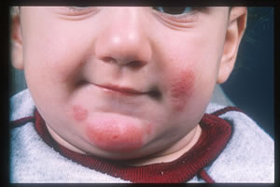Common Childhood Illnesses

TRUE TOLL OF COMMON CHILDHOOD ILLNESSES ON AUSTRALIAN FAMILIES REVEALED - NEW RESEARCH
New research released has revealed that dealing with common childhood illnesses such as colds, flu, diarrhoea and eczema are playing havoc with Australian family life, significantly contributing to parental financial, physical and emotional stresses.
A survey of 600 mothers with children aged between one and two years conducted by Galaxy Research found that the average mother will lose one night's sleep a month caring for infants with coughs, colds and diarrhoea, and working mums have the added problem of needing to take time off to look after these sick children, and this can add up to seven days a year between the working mum and her partner.
As many as 42 percent of these mothers have visited a hospital emergency department for urgent medical attention, 51 percent have needed to make three or more additional trips to the doctor with their child and 36 percent have called a parenting support line in the last 12 months for medical advice on dealing with these issues.
While having miserable children is considered to be the biggest impact of these common childhood illnesses, around half of the mothers of these infants say these conditions result in increased medical costs. For mums with toddlers with eczema, the financial burden extends to having to purchase special laundry powders and products (54 percent), buying clothes only made from certain fibres (32 percent) and visits to a skin or allergy specialist (20 percent).
According to an international infant nutrition expert, the answer may lie in ensuring all infants have access to a unique mix of dietary prebiotics in the first six months of life.
Professor Guido Moro, from The Centre for Infant Nutrition in Italy explains that prebiotics, unlike probiotics, are non-digestible fibres which make their way through the stomach to the gut to encourage the growth of beneficial bacteria. Prebiotics are naturally found in breast milk and are thought to have anti-infectious and immunity boosting benefits. It has long been established that breast milk is the superior method of feeding infants. However, sometimes breast feeding is not possible for some mothers.
Professor Moro studied the impact of a special mix of prebiotics in formula in 259 healthy infants who had at least one parent diagnosed with an allergic disease and whose mother was unable to breast feed. The prebiotic mix was designed to mimic that found naturally in breast milk.
He found that those infants fed formula containing the unique prebiotic mix were 58 percent less likely to develop atopic dermatitis compared to those infants fed with standard formula.
Professor Moro's groundbreaking work was published in the Archive of Disease in Childhood last year.
"These findings are significant because they demonstrate, for the first time, the beneficial effect of prebiotics on the development of chronic skin conditions such as eczema and dermatitis. Infants with eczema often suffer from cracked skin, bleeding from scratching as well as pain and discomfort. Considering this, and the additional financial, emotional and physical impact on family life, the more we can learn about allergy prevention during infancy, the better," he added.
An estimated 20 percent of infants and young children experience symptoms of dermatitis. Around 65 percent of infants develop symptoms in their first year of life and 90 percent develop symptoms before the age of five. Of these children, roughly 60 percent continue to have one or more symptoms of atopic dermatitis in adulthood.
According to the Galaxy research, a third of all infants with eczema are experiencing some level of pain or discomfort on a regular basis (33 percent) and bleeding through scratching (35 percent). A small number even experience trouble with crawling (4 percent). One in three mums said they worry about their child's quality of life as a result (32 percent).
A separate study conducted by Professor Bruzzese, and published in the Journal of Paediatric Gastroenterology & Nutrition, indicates that the same prebiotic formula, if used during the first six months of life, also reduces the incidence of diarrhoea, coughs, colds and other respiratory infections and the risk of recurrent upper respiratory infections in infants.
"While breast feeding is definitely best for babies, some mothers find this difficult for a variety of reasons. This clinical data strongly indicates that this unique mixture of prebiotics may play a role in preventing allergies, reducing the incidence of infections and helping to nutritionally support, in a natural way, the infant's immune system. This is an important development in formula feeding, especially for at risk groups," added Professor Moro.
"Despite the positive results of the research studies, further long-term evaluation is needed to determine the extended impact of this nutritional intervention especially when it comes to its impact on immunity later in life," Professor Moro added.
NB: The research highlighting the impact of common childhood illnesses was conducted online by Galaxy Research in March 2007 among 601 mothers of children aged 1-2 years.
New research released has revealed that dealing with common childhood illnesses such as colds, flu, diarrhoea and eczema are playing havoc with Australian family life, significantly contributing to parental financial, physical and emotional stresses.
A survey of 600 mothers with children aged between one and two years conducted by Galaxy Research found that the average mother will lose one night's sleep a month caring for infants with coughs, colds and diarrhoea, and working mums have the added problem of needing to take time off to look after these sick children, and this can add up to seven days a year between the working mum and her partner.
As many as 42 percent of these mothers have visited a hospital emergency department for urgent medical attention, 51 percent have needed to make three or more additional trips to the doctor with their child and 36 percent have called a parenting support line in the last 12 months for medical advice on dealing with these issues.
While having miserable children is considered to be the biggest impact of these common childhood illnesses, around half of the mothers of these infants say these conditions result in increased medical costs. For mums with toddlers with eczema, the financial burden extends to having to purchase special laundry powders and products (54 percent), buying clothes only made from certain fibres (32 percent) and visits to a skin or allergy specialist (20 percent).
According to an international infant nutrition expert, the answer may lie in ensuring all infants have access to a unique mix of dietary prebiotics in the first six months of life.
Professor Guido Moro, from The Centre for Infant Nutrition in Italy explains that prebiotics, unlike probiotics, are non-digestible fibres which make their way through the stomach to the gut to encourage the growth of beneficial bacteria. Prebiotics are naturally found in breast milk and are thought to have anti-infectious and immunity boosting benefits. It has long been established that breast milk is the superior method of feeding infants. However, sometimes breast feeding is not possible for some mothers.
Professor Moro studied the impact of a special mix of prebiotics in formula in 259 healthy infants who had at least one parent diagnosed with an allergic disease and whose mother was unable to breast feed. The prebiotic mix was designed to mimic that found naturally in breast milk.
He found that those infants fed formula containing the unique prebiotic mix were 58 percent less likely to develop atopic dermatitis compared to those infants fed with standard formula.
Professor Moro's groundbreaking work was published in the Archive of Disease in Childhood last year.
"These findings are significant because they demonstrate, for the first time, the beneficial effect of prebiotics on the development of chronic skin conditions such as eczema and dermatitis. Infants with eczema often suffer from cracked skin, bleeding from scratching as well as pain and discomfort. Considering this, and the additional financial, emotional and physical impact on family life, the more we can learn about allergy prevention during infancy, the better," he added.
An estimated 20 percent of infants and young children experience symptoms of dermatitis. Around 65 percent of infants develop symptoms in their first year of life and 90 percent develop symptoms before the age of five. Of these children, roughly 60 percent continue to have one or more symptoms of atopic dermatitis in adulthood.
According to the Galaxy research, a third of all infants with eczema are experiencing some level of pain or discomfort on a regular basis (33 percent) and bleeding through scratching (35 percent). A small number even experience trouble with crawling (4 percent). One in three mums said they worry about their child's quality of life as a result (32 percent).
A separate study conducted by Professor Bruzzese, and published in the Journal of Paediatric Gastroenterology & Nutrition, indicates that the same prebiotic formula, if used during the first six months of life, also reduces the incidence of diarrhoea, coughs, colds and other respiratory infections and the risk of recurrent upper respiratory infections in infants.
"While breast feeding is definitely best for babies, some mothers find this difficult for a variety of reasons. This clinical data strongly indicates that this unique mixture of prebiotics may play a role in preventing allergies, reducing the incidence of infections and helping to nutritionally support, in a natural way, the infant's immune system. This is an important development in formula feeding, especially for at risk groups," added Professor Moro.
"Despite the positive results of the research studies, further long-term evaluation is needed to determine the extended impact of this nutritional intervention especially when it comes to its impact on immunity later in life," Professor Moro added.
NB: The research highlighting the impact of common childhood illnesses was conducted online by Galaxy Research in March 2007 among 601 mothers of children aged 1-2 years.
MORE



